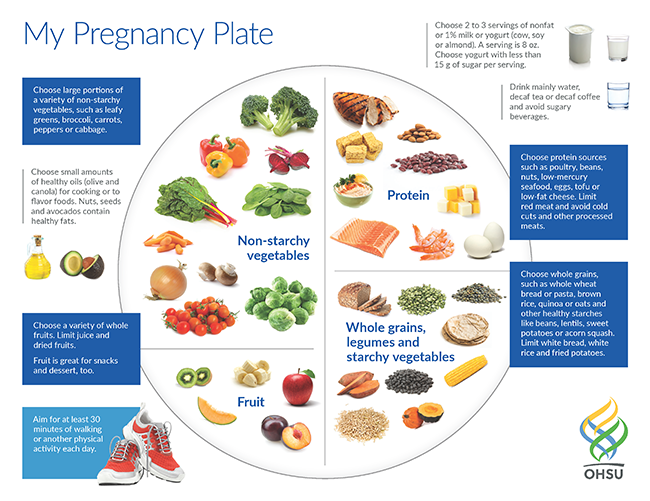
Nutrition During Pregnancy: A Comprehensive Guide
Pregnancy is a transformative journey that requires a significant increase in nutrient intake to support the growth and development of the baby. A balanced and nutritious diet is essential for both the mother’s well-being and the baby’s optimal health. This article provides a comprehensive guide to nutrition during pregnancy, covering essential nutrients, recommended food groups, dietary restrictions, and tips for maintaining a healthy weight.
Essential Nutrients
- Folic Acid: This B vitamin is crucial for preventing neural tube defects in the baby. It is recommended to consume 600 mcg of folic acid daily, starting before conception and continuing throughout the first trimester.
- Iron: Iron is necessary for red blood cell production, which carries oxygen to the baby. Pregnant women require 27 mg of iron daily, and this amount increases to 30 mg during the third trimester.
- Calcium: Calcium is essential for bone development in the baby. The recommended daily intake is 1,000 mg, which can be obtained from dairy products, leafy green vegetables, and fortified foods.
- Protein: Protein is the building block for the baby’s tissues and organs. Pregnant women should consume 71 grams of protein daily, which can be found in lean meats, poultry, fish, beans, and lentils.
- Omega-3 Fatty Acids: Omega-3 fatty acids are essential for brain and eye development in the baby. The recommended intake is 200 mg per day, which can be obtained from fatty fish, flaxseed, and walnuts.
Recommended Food Groups
- Fruits and Vegetables: Fruits and vegetables are rich in vitamins, minerals, and antioxidants. Aim for at least five servings per day, including a variety of colors and types.
- Whole Grains: Whole grains provide fiber, which is important for digestion and blood sugar control. Include whole-wheat bread, brown rice, and quinoa in your diet.
- Lean Protein: Lean protein sources include chicken, fish, beans, and tofu. These foods provide essential amino acids for the baby’s growth.
- Dairy Products: Dairy products are a good source of calcium, protein, and vitamin D. Choose low-fat or nonfat options to limit saturated fat intake.
- Healthy Fats: Healthy fats, such as those found in olive oil, avocados, and nuts, are essential for brain development and cell function.
Dietary Restrictions
- Alcohol: Alcohol should be avoided during pregnancy as it can cross the placenta and harm the baby.
- Caffeine: Caffeine consumption should be limited to 200 mg per day, as excessive intake can increase the risk of miscarriage and low birth weight.
- Raw or Undercooked Meat and Fish: These foods may contain harmful bacteria that can cause infections.
- Unpasteurized Milk and Cheese: Unpasteurized dairy products can contain bacteria that can cause foodborne illnesses.
- Certain Fish: High-mercury fish, such as shark, swordfish, and king mackerel, should be avoided as they can accumulate mercury in the baby’s developing nervous system.
Maintaining a Healthy Weight
- Weight Gain: The recommended weight gain during pregnancy varies depending on the woman’s pre-pregnancy weight. Most women should gain between 25 and 35 pounds.
- Calorie Intake: Calorie needs increase during pregnancy, but it is important to focus on nutrient-rich foods rather than empty calories.
- Exercise: Regular exercise is safe and beneficial during pregnancy. Aim for at least 150 minutes of moderate-intensity exercise per week.
- Hydration: Stay well-hydrated by drinking plenty of water throughout the day.
Additional Tips
- Prenatal Vitamins: Prenatal vitamins provide essential nutrients that may not be obtained from diet alone.
- Food Safety: Practice good food safety habits, such as washing fruits and vegetables thoroughly and cooking meat to a safe internal temperature.
- Listen to Your Body: Pay attention to your body’s cues and eat when you are hungry. Avoid overeating or skipping meals.
- Seek Professional Advice: Consult with a healthcare professional or registered dietitian for personalized nutrition guidance and to address any specific concerns.
Conclusion
A nutritious diet during pregnancy is crucial for the health and well-being of both the mother and the baby. By consuming a balanced diet rich in essential nutrients, following recommended food groups, and adhering to dietary restrictions, pregnant women can ensure that their bodies and their babies receive the nourishment they need to thrive. Remember to listen to your body, seek professional advice when necessary, and enjoy this transformative journey with a focus on healthy nutrition.